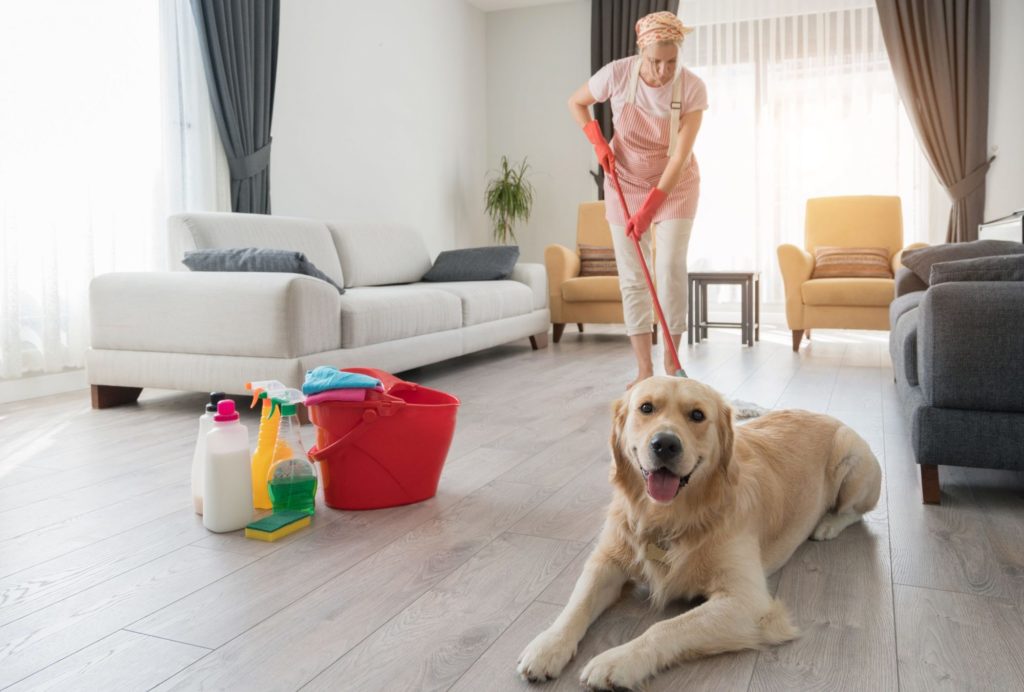
Creating a Pet-Friendly Home: House Cleaning Tips for Pet Owners:
Having pets can be a joy, but it can also make keeping your home clean a challenge. Here are some top tips and tricks for cleaning your house with pets
- Regular Grooming: Brush and groom your pets regularly to minimize shedding and keep loose fur under control.
- Vacuum Frequently: Use a vacuum cleaner with a pet hair attachment to effectively remove pet hair from carpets, furniture, and other surfaces.
- Lint Rollers: Keep lint rollers handy to quickly remove pet hair from clothing and upholstery.
- Wash Pet Bedding: Wash your pets’ bedding and toys regularly to reduce odors and bacteria buildup.
- Stain and Odor Removers: Have pet-friendly stain and odor removers on hand to quickly address accidents.
- Litter Box Maintenance: Scoop the litter box daily and change the litter regularly to prevent odors.
- Hardwood Floors: Clean hardwood floors with pet-safe cleaning solutions to avoid damage from accidents or scratches.
- Pet-Safe Cleaners: Use non-toxic, pet-safe cleaners for surfaces your pets come in contact with.
- Frequent Washing of Pet Bowls: Wash food and water bowls daily to prevent bacteria growth and odors.
- Regular Vet Visits: Regular vet visits can help maintain your pets’ health, potentially reducing excessive shedding and accidents.
- Outdoor Paw Cleaning: Keep a towel near entrances to wipe your pets’ paws after outdoor activities, preventing dirt from being tracked indoors.
- Contain Shedding Areas: Designate certain areas where shedding is easier to manage, such as placing a pet bed on a washable mat.
- Regular Bathing: Bathe your pets as needed to keep their coats clean and minimize odors.
- Air Purification: Consider using air purifiers to help remove pet dander and allergens from the air.
- Chew Toys: Provide appropriate chew toys to prevent pets from chewing on furniture or other items.
- Fabric Softener Sheets: Rubbing fabric softener sheets on upholstery can help repel pet hair.
- Car Seat Covers: Use seat covers in your car to protect it from pet hair and dirt.
- Train for Cleanliness: Train your pets to follow commands related to staying off furniture or specific areas to make cleaning easier.
- Pet-Proof Trash Cans: Use pet-proof trash cans to prevent pets from getting into the trash and scattering it.
- Routine Cleaning Schedule: Establish a routine cleaning schedule to stay on top of pet-related messes.
Here are a few areas that could potentially relate to pet owners and cleanliness in Nebraska:
-
Animal Control and Licensing: Many cities and counties have regulations regarding the licensing and control of pets. This can include requirements for vaccinations, leashing, and the prevention of public disturbances.
-
Nuisance Laws: Local ordinances might address issues such as excessive noise, animal waste, and other disturbances caused by pets. These laws aim to ensure that pets do not become a nuisance to neighbors and the community.
-
Animal Waste Disposal: Many areas have regulations regarding the proper disposal of pet waste. Pet owners may be required to clean up after their pets when in public spaces, like parks and sidewalks.
-
Zoning and Pet Limits: Zoning laws in certain areas might impose restrictions on the number of pets a household can have. These regulations are often in place to prevent overcrowding and ensure the well-being of the animals.
-
Hygiene and Public Health: In the interest of public health and safety, pet owners are typically expected to maintain a clean environment both indoors and outdoors. This includes regular cleaning to prevent odors and the spread of diseases.
-
Rental and Lease Agreements: For those who rent their homes, landlords may include clauses in lease agreements regarding pet cleanliness and any potential damage caused by pets.
It’s important to note that laws and regulations can vary widely depending on the specific city or county in Nebraska. If you’re a pet owner in Nebraska and want to understand the specific regulations that apply to you, it’s recommended to contact your local city or county government offices or animal control authorities. They can provide you with accurate and up-to-date information on any relevant laws, ordinances, or regulations that pertain to pet ownership and cleanliness in your area.

